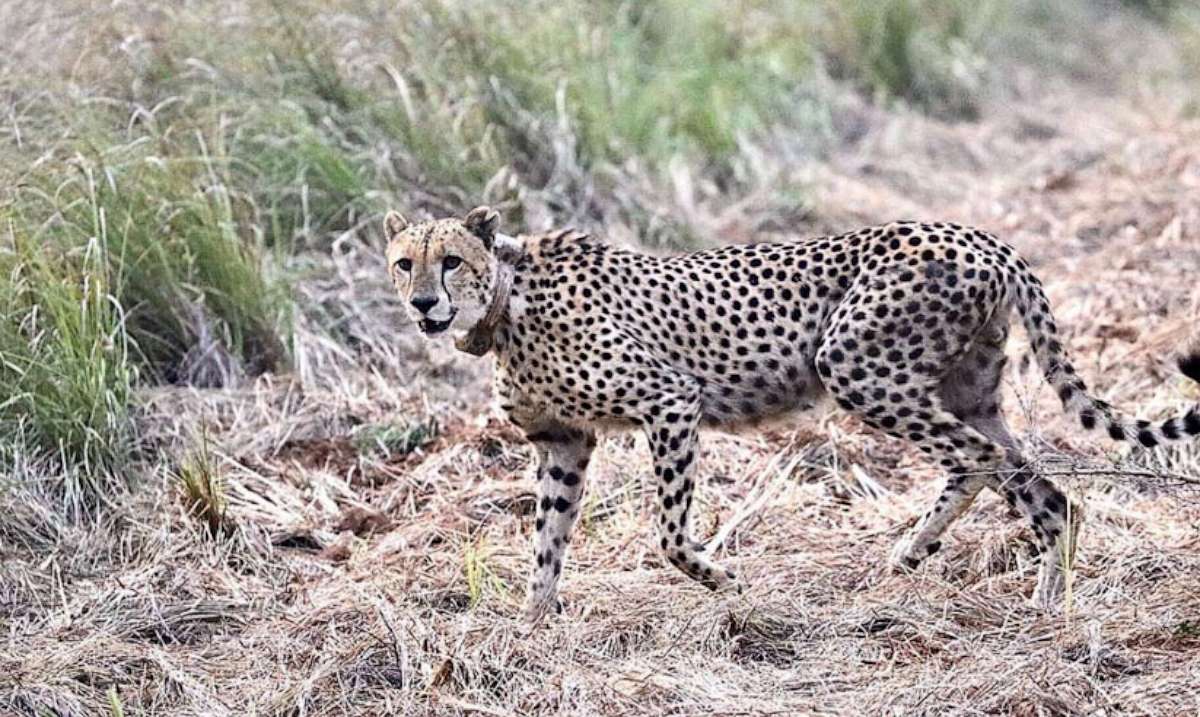100 cheetahs sent to India from South Africa in attempt to repopulate the species
Some 70 years after humans drove cheetahs to extinction in India, the country now seeks to bring them back.
In efforts to reestablish a population, South Africa will ship about 100 of the carnivorous cats to India over the next decade with the first batch of felines set to arrive this month.
The animals will end up in central India’s Kuno National Park, with protected areas home to rare and endangered animals. The cats are among the initial ones introduced in India under Project Cheetah, the first intercontinental translocation initiative of its kind.

The African cheetahs that will be arriving in India are not native to the region but the incoming cats belong to the genetically distinct African subspecies which diverged from its Asiatic cousin thousands of years ago. The now-critically endangered subspecies, the Asiatic cheetah, originally roamed from the Arabian Peninsula to central India, but now only a handful of them remain in Iran and they thought to be inbred with questionable long-term viability.
India's development in the last 100 years has seen much of the grasslands, where the cats lived and thrived, transformed into farmland. Along with the loss of their natural habitat, prey depletion and hunting also led to their local extinction. In fact, the last known photograph of wild cheetahs in India shows three dead cats posed in front of a hunter more than 70 years ago in 1948.
By moving these cats to India, Project Cheetah seeks to relieve some pressure on South African reserves -- where the animals are numerous -- while hoping to boost overall cheetah numbers worldwide. It is estimated there are only around 7,000 of the African cats alive today.
India hopes the relocation operation will help sustain biodiversity while also sparking eco-tourism which, in turn, could help local communities economically. To get people excited for the project, the government even recently ran a month-long campaign where people could suggest names for the cheetahs and win a chance to see them.
Dhrushti, Raftaar, Tez....here are some of the interesting names we have received for the beloved Cheetahs!
Send us more suggestion and win a trip to see the Cheetahs!
Send the names here : https://t.co/4txIljzcJg pic.twitter.com/vWxmYEB2H9
— MyGovIndia (@mygovindia) October 12, 2022
Zoologist Nobuyuki Yamaguchi of University of Malaysia, Terengganu, tells ABC News that, despite setbacks, healthy cats from Africa would be able to survive in their new Indian environment.

“Some will die but many die in their native habitats in Africa, too,” Yamaguchi said.
Yamaguchi also says the national park the cheetahs will call home can only host between eight to 25 of the cats.
“Conservationists may need to explore the possibility that the cheetahs can live in a human-dominated landscape around the park," Yamaguchi continued. "Asian lions and leopards currently live outside of parks, but no one knows yet if cheetahs can do it, too.”
While excitement continues to build for the cheetahs' arrival, it remains to be seen whether support for the African cheetahs will continue long-term. Critics claim the space-requiring cats will eventually face the same human pressure that killed them off decades ago.
India’s government, however, has pledged to expediently manage human-cheetah conflict in conservation areas “through compensation, awareness, and management actions to win community support.”
Yet despite government backing for Project Cheetah and a groundswell of support from the scientific community, the animal’s legal right to exist in the country isn’t guaranteed. The Indian Supreme Court has made it abundantly clear that the translocated cheetahs “would be introduced on an experimental basis.”
Many questions remain about whether translocating a subspecies of cheetah to a new ecosystem thousands of miles away is an effective and ethical way of preserving biodiversity. Some argue that India already has big cats and that the country’s resources should be used on human-related problems, such as overpopulation and poverty.
Carnivore biologist Dr. K. Ullas Karanth, Emeritus Director for the India-based Centre for Wildlife Studies, tells ABC News that Project Cheetah is costly and ill-conceived.
“Basically, the science underpinning this project is poor and India's wildlife management system is by-and-large not fully trained in the science involved," Karanth said. "The population models used for Cheetahs are deeply flawed. The African conservationists involved in the project have surplus cheetahs they want to get rid of, and they have no idea of the social conditions in India these cheetahs will face.”
Karanth says the worst-case outcome of Project Cheetah would be of the needless creation of captive, artificially-fed cats in large enclosures.

“Establishing a free-ranging wild cheetah population in India is a multi-decade effort of relocating some villages, in a more arid, much larger area in Western India with sustainable wild prey populations," Karanth continued. "The size of such an area should be 6,000 to 10,000 square miles .. Bringing the cheetahs over before they have ample land to sustain them is putting the cart before the horse.”
The cats arriving from South Africa will eventually join eight radio-collared cheetah’s -- three males and five females -- which were translocated in September 2022 from Namibia.
The World Wildlife Fund of India tells ABC News the short-term success of Project Cheetah will be seen as a success if the translocated cheetahs can adapt to and breed in their new environment.
“The initial years of the project will be the most crucial to the beasts’ long-term survival. Ultimate success will be determined by the species persisting in the wild and occupying some of its historical habitats. Only time will tell whether the return of the cheetah will contribute to the overall conservation of wildlife in India -- either way, there will be great learning through this whole process.”




